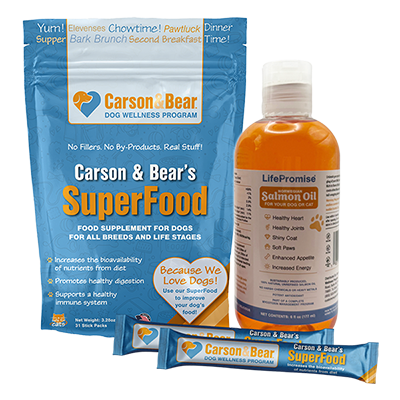In the rapidly evolving landscape of dog nutrition, where new trends emerge and old myths are debunked, it’s easy for dedicated pet parents, like you, to feel overwhelmed. We offer you this guide that aims to provide clarity, a bit of history, insights on trends, and some practical advice for making good choices for your dog’s diet and care.
A Brief History of Canine Nutrition
Evolving research on dog nutrition reflects a deepening understanding of what dogs need to thrive. From the basic table scraps of the early 1900s to the more sophisticated commercial dog foods of the mid-20th century, each era has contributed to a greater understanding of canine dietary needs. The evolution was propelled by scientific research, which identified crucial nutrients for dogs’ health and led to the development of specialized diets. Researchers identified specific nutrients essential for dogs’ health, such as protein, fats, carbohydrates, vitamins, and minerals.
In the 1970s and 1980s, there was a growing focus on the importance of life-stage nutrition for dogs. For example, your puppy has very different dietary needs than a geriatric dog. This led to dog foods formulated for each life stage. Today there is renewed interest in how nutrition factors into preventing and managing chronic diseases in dogs. We know diet can play a role in managing conditions such as obesity, diabetes, and arthritis, and this knowledge is resulting in dog foods specifically designed to manage these conditions. Advancements are producing nutrition advice and products that emphasize the importance of a balanced, tailored diet for dogs of different breeds, ages, and health conditions.
What we know about dog nutrition
Understanding dog nutrition is complex, and because you love your dog, you want to know more. We know that dogs have individual nutritional needs, and their diet can affect their health and well-being. As a result, a wide variety of dog foods, supplements, and products are available for pet parents to help meet their dog’s needs. There are still many unknowns, including bioactive compounds, but staying informed through this website and shared information is a great start. To help you learn more, here are examples of what we know today about dog nutrition:
- Personalized nutrition: Recognizing that each dog has unique nutritional needs based on breed, age, activity level, and health status.
- Functional nutrition: Utilizing food to promote specific health benefits, such as joint health, cognitive function, or skin and coat health.
- Prebiotics and probiotics: Emphasizing the importance of gut health and the role of prebiotics and probiotics in maintaining a healthy digestive system and good overall health.
- Novel protein sources: Exploring alternative protein sources, such as insects or plant-based proteins to meet the nutritional needs of dogs with allergies or sensitivities.
- Hydration: Recognizing the importance of adequate water intake for overall health and well-being. Your dog can get hydration from having food that is high in moisture rather than dry kibble.
- Mindful feeding: Promoting responsible feeding practices to prevent obesity and other health problems associated with overfeeding.
- Raw food diets: Consist of uncooked meat, bones, and organs.
- Home-cooked meals: Cooking meals for their dogs at home allows owners to control the ingredients and ensure that their dogs get the nutrients they need.
- Nutraceuticals: Supplements that are added to food to provide health benefits. Some common dog nutraceuticals include glucosamine, chondroitin, and omega-3 fatty acids.
How Do I Know If I’m Doing Dog Nutrition Right?
When your dog’s nutritional needs are met, it experiences many positive physical and mental health benefits. Their energy levels are high, and they engage in playful activities and maintain a healthy weight. Their coat is shiny and lustrous, reflecting their overall well-being. Their skin is supple and free from dryness, irritation, or flakiness. And their digestive system functions optimally, effectively absorbing essential nutrients and eliminating waste products. Their bones and muscles develop strength and resilience, supporting their active lifestyle.
If you notice opposite conditions – low energy, dull coat, flaky irritated skin, digestive issues – it can signal the need for a closer look at your dog’s nutrition. Pet parents, please know that nutritional imbalance won’t always have visible signs. In many cases, symptoms may be subtle or not exist, so keep a close eye on your furry friend. Watch carefully for indicators, including signs of obesity, gastrointestinal problems, itchy skin and ears, or dull coat. When in doubt, check it out!
Check with your vet about nutrition
In the complex world of dog nutrition, veterinarians are indispensable allies. Whether it’s addressing specific health concerns or navigating the myriad of food choices, a veterinarian’s input is invaluable. They can help you tailor recommendations based on your dog’s unique circumstances. They can assess your dog’s health, identify potential nutritional deficiencies or concerns, and recommend appropriate dietary modifications to address specific health issues. Veterinarians also can help you assess food options to help you meet your dog’s needs and preferences. And rely on your veterinarian to help monitor your dog’s progress on the new diet, adjusting to optimize their health and well-being.
Online resources can help
While the internet offers a vast array of information on dog nutrition, it’s essential to approach this resource with a critical eye. Look for advice from credible sources, such as veterinary websites or scientifically backed pet nutrition blogs. Be cautious of trendy diets or anecdotal advice found on social media and forums, as these sources can often be misleading or inaccurate. Instead, seek out information that is supported by scientific research and aligns with your veterinarian’s recommendations. Also, online forums and communities dedicated to dog ownership can be valuable sources of real-world experiences and peer-to-peer support. And remember: Not all advice shared online is reliable, so it’s always best to consult with a veterinarian for guidance.
How Carson and Bear helps you understand your dog’s nutrition
Like you, we love dogs. We are inspired to offer several ways to make dog nutrition easier for you and tastier for your dog. Our subscribers receive monthly shipments of Carson & Bear Superfood and fish oil toppers for your dog’s meals. These toppers help improve the nutrient bioavailability of any dog food. We also offer the Nutrition and Longevity Clinic, which provides personalized breed nutrition recommendations. If you’re interested in making fresh food for your dog, the Kitchen provides easy-to-make recipes that will make your dog’s mouth water.
We want to simplify the complexities of dog nutrition. With the right approach, what you feed your furry friend becomes an opportunity to significantly enhance its health, well-being, and longevity. By staying informed, consulting with your veterinarian, and utilizing resources like Carson and Bear, you can make informed decisions that will benefit your canine companion for years to come.



